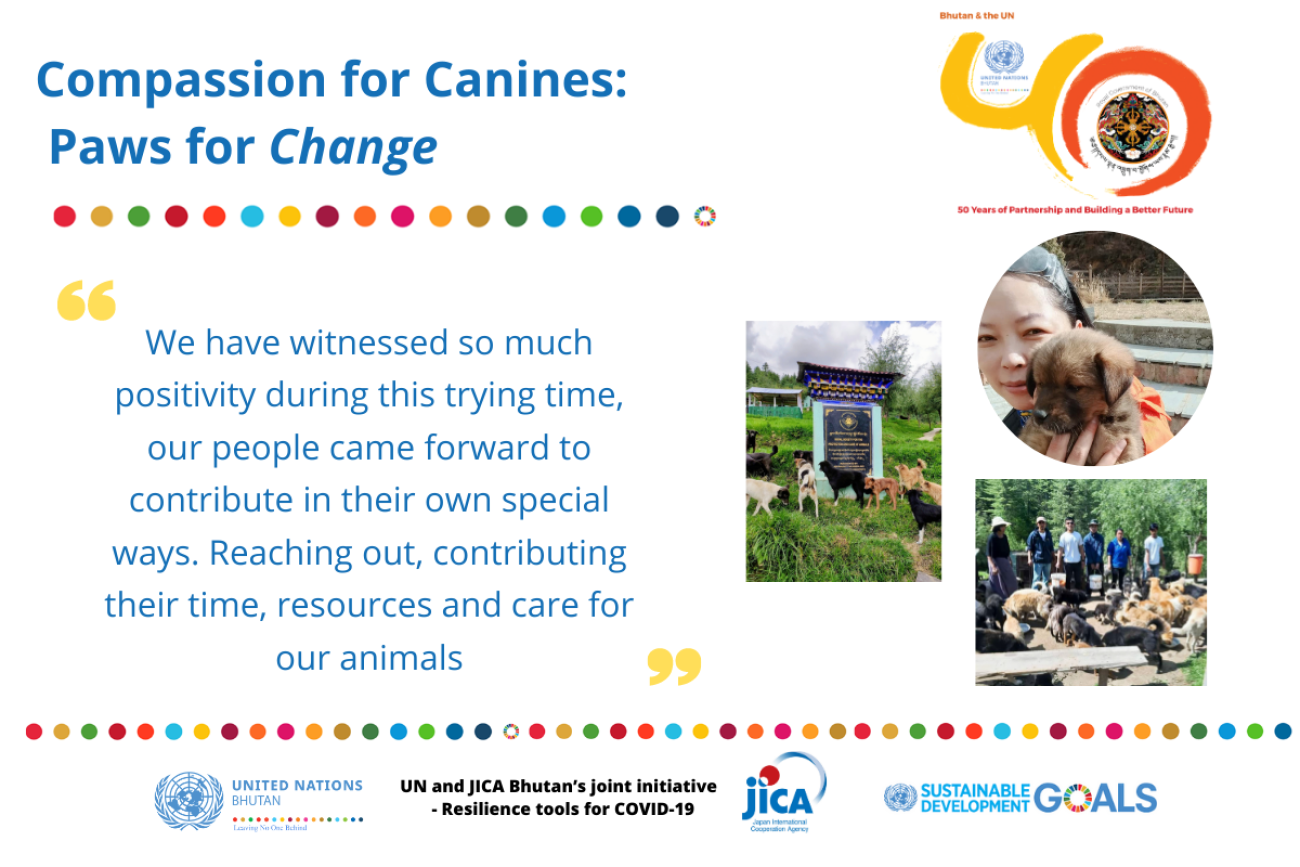Compassion for Canines: Paws for Change

UN and JICA Bhutan’s joint initiative - Resilience tools for COVID-19
Meet Enji – a scrappy, scruffy dog adopted by a monk living at the Kabesa Monastery. Sadly the monk soon moved away for meditation and without his owner Enji grew aggressive and temperamental, biting visiting pilgrims. For most this is where Enji’s story would have remained, instead he was brought to the Royal Society for the Protection and Care of Animals (RSPCA). At the “House for the Downtrodden” RSPCA shelter, Enji was given a second chance. The constant support and love from the RSPCA team coaxed him out of his shell and returned Enji to the friendly dog he truly was. If you were to visit now, Enji would be one of the first four-legged friends to excitedly welcome you.
Enji is one of the many success stories of RSPCA, showcasing their invaluable impact and contribution to animal welfare in our community. At the helm of the organisation, is Ms. Tashi Payden, the Executive Director of RSPCA and an avid animal-lover herself. Founded in 1999,
“RSPCA is the first organization of its kind in the Kingdom to actively alleviate animal maltreatment. Dedicated to finding appropriate and effective measures to combat cruelty towards animals, the organization operates on a strictly non-profit basis” said Payden.
A beacon for animal rights and advocacy, RSPCA encourages humane treatment of animals through promoting awareness of their plight in Bhutan. The history of RSPCA is tied directly to Payden’s dedication and passion for the cause.
“This organisation was founded out of my sheer love for animals, especially the stray dogs who were sadly mistreated when I was growing up. RSPCA was founded out of the necessity to give a voice to animals, since at the time there were no animal welfare organisations in the country. I am so grateful for the Royal Patronage of Her Majesty Gyalyum Tshering Yangdoen Wangchuck and the support from animal lovers who gave life to this organisation” shared Payden.
When the pandemic hit, the risk of stray animals becoming extremely vulnerable was a growing and alarming concern.
“During the very few days of the first lockdown, we received overwhelming calls from people worried for the welfare of strays--it was heart-warming” Payden recalls.
RSPCA paused ongoing programs and volunteer work but responded with the full utilization of their social media platforms by creating innovative ways to inspire the public. Hosting the first of its kind, an online “Pawsitive” concert with local talent performing at a virtual fundraiser, raised close to Nu.80,000.
“We have witnessed so much positivity during this trying time, our people came forward to contribute in their own special ways. Reaching out, contributing their time, resources and care for our animals,” said Payden.
The RSPCA shelter is a safe haven for injured and abandoned animals, where they can find their forever home. At the heart is the RSPCA team, each with their own dynamic roles and without whom there would be no true progress. Payden emphatically highlights the importance of her team from Aum Lhamu the main care-taker providing the animals with constant care, to the strong board of trustees, big-hearted team members, and volunteers contributing to the organisation.
“The RSPCA is tremendously blessed to have all these strong people. supporting our cause. They are its backbone” said Payden beaming.
“At the start of the first lockdown, when the Royal Command came to feed the strays–we cried tears of gratitude and relief, the magnanimity was so great, beyond what we could have imagined or reached – feeding the strays not only in Thimphu but across the nation.” said Payden.
Following the first lockdown, collaborating with the DeSuung Office and the National Veterinary Hospital, the RSPCA trained 33 DeSuups in animal welfare and first aid. This training proved vital during the second lockdown for the care and rescue of animals. Payden herself an active DeSuup volunteered her services and knowledge in the logistics committee.
The powerful movement for animal welfare must continue and thrive and Payden sees the youth of Bhutan as key, “Working with the youth is very important– they are our future. We need them to fulfil our vision. Through creating awareness among the younger generation, it is possible to create a future where animals and humans can continue in harmony”.



